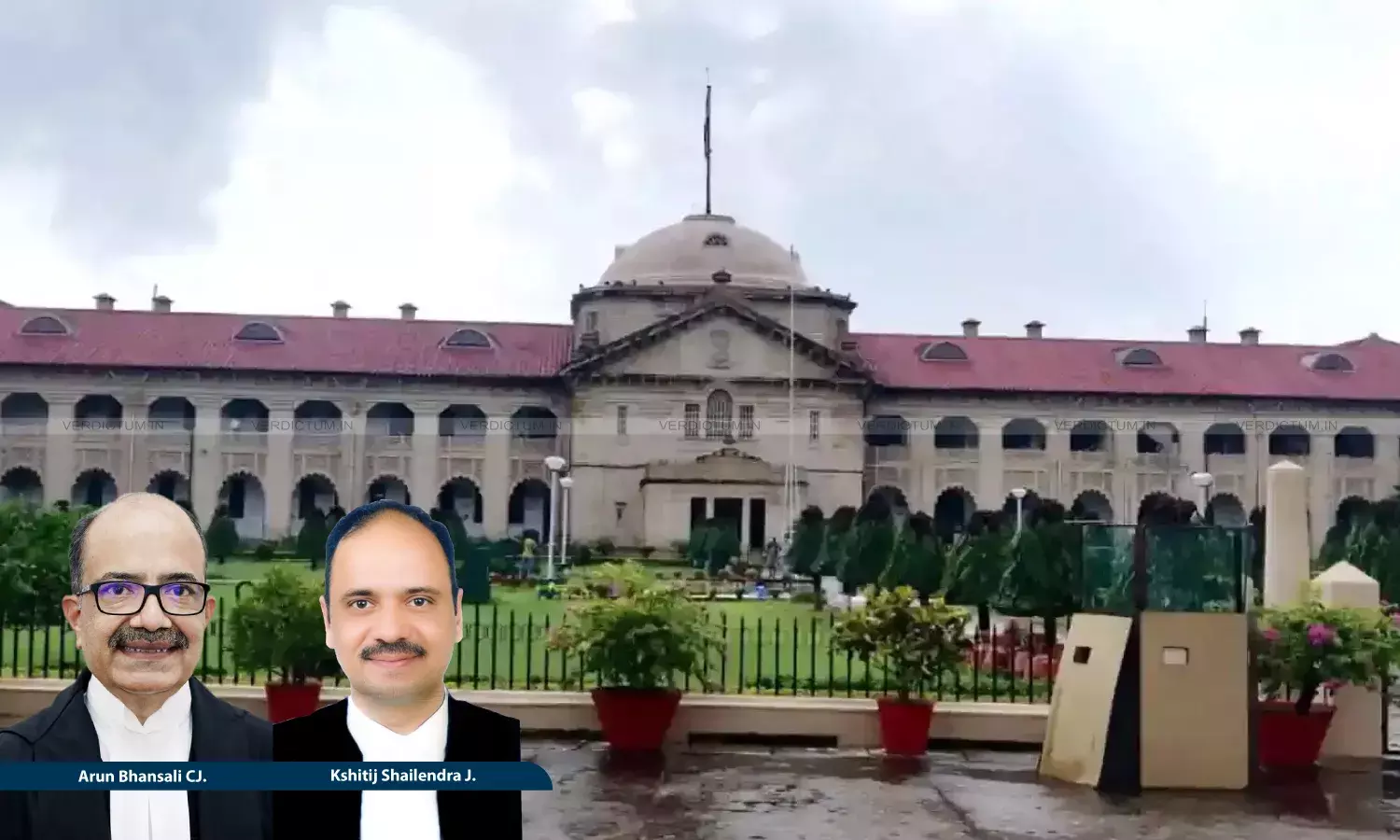Denial Of Higher Pay To Employee Officiating On Higher Post Contrary To Law And Public Policy: Allahabad High Court
The High Court held that once an employee is made to discharge duties of a higher post, the emoluments attached to that post cannot be denied, as such denial violates settled legal principles and is unenforceable under Section 23 of the Contract Act.

Chief Justice Arun Bhansali, Justice Kshitij Shailendra, Allahabad High Court
The Allahabad High Court has held that when an employee is placed on a higher post in an officiating or stop-gap capacity, denial of salary attached to that post would run contrary to public policy and would also be unenforceable under Section 23 of the Indian Contract Act.
The Court was hearing a writ petition filed against an order of the Central Administrative Tribunal, which had rejected the petitioner’s claim for salary in the pay scale of Head Master for the period during which he had worked in that capacity.
A Division Bench of Chief Justice Arun Bhansali and Justice Kshitij Shailendra referred to the legal position settled by the Supreme Court in Secretary-cum-Chief Engineer, Chandigarh vs. Hari Om Sharma, 1998, noting that “if a person is promoted to the higher post or put to officiate on that post or a stop-gap arrangement is made to place him on the higher post, denial of salary to him for a higher post would be contrary to law and also against public policy.”
Advocate Amardeo Singh appeared for the petitioner, while the respondents were represented by Advocate Agam Narain Roy.
Background
The petitioner was working as a Trained Graduate Teacher in a substantive capacity. Upon the superannuation of the Head Master (Junior Wing), he was directed to take over charge and work as Teacher-in-Charge until a permanent successor was posted. He continued in this role for more than three years, performing functions associated with the Head Master’s responsibilities.
During this period, he was subjected to departmental proceedings in which he was repeatedly referred to as Head Master (Junior Wing). Though absolved in appeal, his request for a salary in the higher scale was not considered.
He approached the Tribunal seeking the salary attached to the post of Head Master for the period he discharged those duties. The Tribunal dismissed the claim, holding that he had not been formally promoted and no rule had been shown entitling him to the higher pay.
Aggrieved, he approached the High Court.
Court’s Observation
The Allahabad High Court examined the office order directing the petitioner to take charge from the outgoing Head Master and noted that he had continuously discharged the duties of the higher post. The Court found from the record that during departmental proceedings, he was addressed as Head Master, and the charges levelled against him pertained to functions ordinarily associated with the Head of the institution.
The Court held that the duties performed by the petitioner were not of a routine nature and could not be equated with holding an additional charge of a post that had never been filled. The vacancy arose due to superannuation, and the petitioner had been placed in full charge until a permanent incumbent joined.
The Bench rejected the respondents’ reliance on instructions 646 and 648(e) of the Indian Railway Establishment Code, noting that they applied to routine or additional charge situations and not to cases where an employee officiated on a higher post that had actually fallen vacant.
Referring to the Supreme Court decisions in Selvaraj v. Lt. Governor of Island, Port Blair and Secretary-cum-Chief Engineer, Chandigarh v. Hari Om Sharma, the Court reiterated that when an employee works on a higher post in an officiating capacity, even temporarily, he is entitled to the salary of that post. Denial of such salary would not only be contrary to law but would also be “unenforceable in law in view of Section 23 of the Contract Act.”
Conclusion
Accordingly, the Court held that the petitioner was entitled to the salary of the post of Head Master for the period he officiated on that post.
The order of the Tribunal was set aside, and the respondents were directed to pay the salary for the relevant period, after adjusting the amounts already paid to him as a Trained Graduate Teacher.
The Court also directed payment of simple interest at 6% per annum from the date of filing of the O.A. until actual payment. The writ petition was allowed in the aforesaid terms.
Cause Title: Uma Kant Pandey v. Union of India & 3 Ors. (Neutral Citation: 2025:AHC:200805-DB)
Appearances
Petitioner: Advocate Amardeo Singh
Respondents: A.S.G.I., with Advocate Agam Narain Roy


